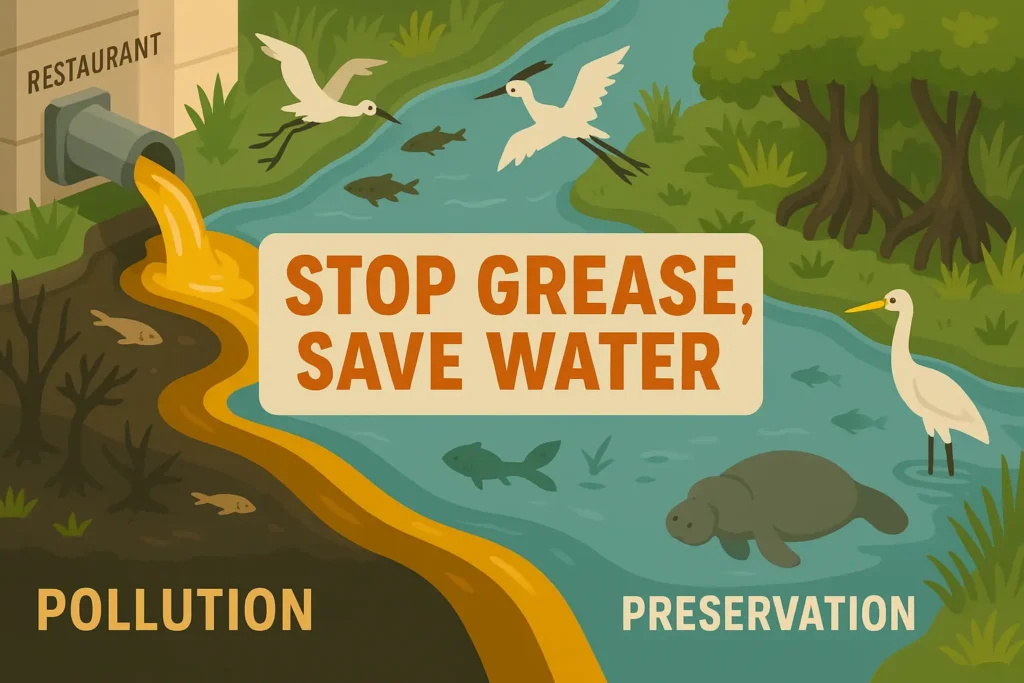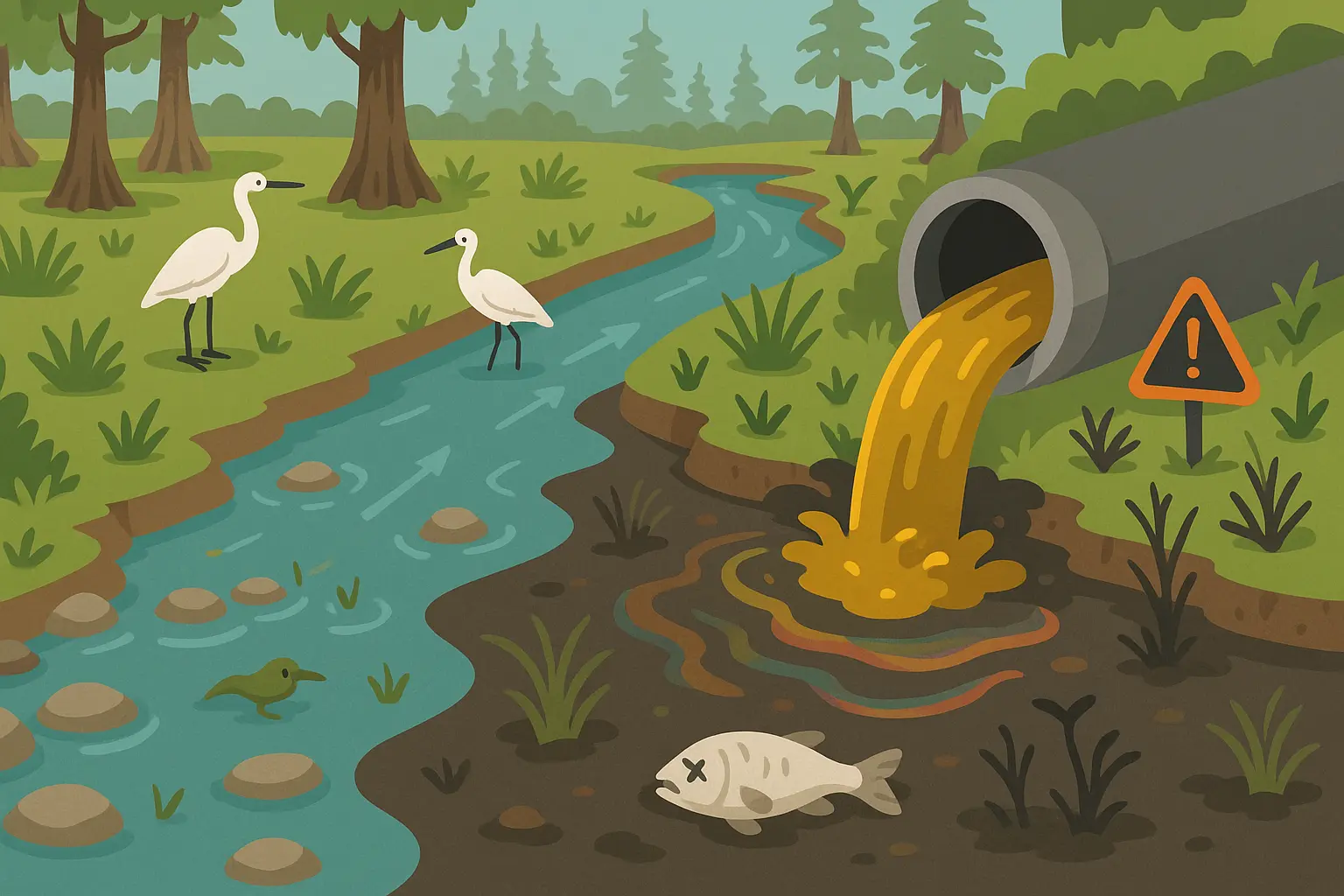Table of Contents
The Ripple: Oil Down the Drain = Dirty Waterways
A single gallon of fryer oil can foul one million gallons of freshwater, starving it of oxygen and sunlight. When grease floats, it blocks light; when it sinks, it smothers stream beds, wiping out insect larvae that fish depend on. NOAA notes that even thin surface sheens coat birds’ feathers and turtles’ shells, reducing insulation and buoyancy. Improper disposal also contributes 47 percent of sewer blockages nationwide, according to an EPA Report to Congress.
Fatbergs: Sewer Monsters Costing Cities Millions
When hot Miami kitchens pour grease into sinks, it cools in the pipes, bonding with calcium and trash to form fatbergs bigger than SUVs. London spent over half a million dollars removing one 11 ton mass. Tampa warns the same can happen each hurricane season if drains stay clogged. Engineers now coat pipes to repel grease because fatbergs already cause 40 percent of blockages worldwide. Clearing these monsters diverts utility budgets from sewer upgrades costs rate payers ultimately foot.

Fish, Birds & Beaches: How Grease Kills Local Ecosystems
Floating oil cuts off oxygen, leading to fish kills in Biscayne Bay and the St. Johns River. Sticky fats coat mangrove roots and oyster beds, reducing juvenile survival rates, while submerged globules drive down dissolved oxygen needed by shrimp in coastal Georgia marshes. Sea birds that preen oily feathers ingest toxins, lowering hatch rates. Tourists notice rainbow sheens near Jacksonville Beach after every storm overflow hurting local hospitality revenue.
Wastewater Plants Overloaded by FOG
Grease congeals inside lift station pumps, forcing emergency bypasses that dump raw sewage directly into rivers. Florida’s DEP lists SSOs topping 250 million gallons after heavy rains when pipes already constricted by grease backed up. Miami Dade’s FOG program warns that hardened grease “blocks wastewater flow and clogs pipes,” triggering street level overflows that cost thousands to sanitize. EPA data show grease is the single largest cause of treatment plant interference.
Soil & Groundwater: The Damage You Can’t See
Dumped oil seeps through parking lot cracks, binding to soil particles and trapping heavy metals. That mix washes into aquifers during Florida’s porous limestone storms, a pathway Georgia EPD flags as a groundwater threat. Researchers find hydrocarbons linger in clay for decades, starving tree roots of air and nutrients. Contaminated runoff from Atlanta alleys has already triggered $800 jetting bills for nearby cafés forced to prove they weren’t the source.
Laws & Fines: What Restaurants Face in FL, GA & NJ
| State | Fine Range* | Key Statute/Policy |
|---|---|---|
| Florida | $250 – $5,000 per offense | County FOG ordinances |
| Georgia | Up to $25,000 per day for knowing violations | O.C.G.A. §12 15 21 |
| New Jersey | $2,500 first offense; $5,000 second | S3437 (2024) |
EPA can also seek criminal charges up to three years in prison for repeat offenders.
Compliance Made Easy: Grease Connections’ 24/7 Monitored Service
Grease Connections advises every restaurant in Orlando, Savannah, and Camden to recycle through a licensed used collection company ideally one that proves every pick up. Our hurricane proof steel containers send real time fill levels to your phone; when they hit 80 percent, a Miami or Atlanta driver is auto dispatched. Service logs sync to a cloud dashboard that inspectors accept as digital manifests, cutting audit prep from hours to minutes. Clients who switched report zero FOG citations since 2022 (internal logs; independently verifiable upon request).
The Grease Connections Spill Free Guarantee
If we miss a scheduled pick up and you receive a grease related fine, we pay it no questions asked. Then our emergency crew arrives in under four hours to clean, jet, and document the site. The guarantee covers Miami Beach, Jacksonville, Atlanta, Savannah, Newark, Camden, and every neighborhood we serve across FL, GA, and NJ. That’s “worry free” in writing.
Ready to Protect Water & Wallet? Claim Your Free Oil Audit
Answer two questions location and estimated oil volume and our team schedules a same week visit. You’ll receive: a container size recommendation, projected rebate credits, and a compliance checklist tailored to your city code. Skip the guesswork, save the ocean, and keep the health inspector smiling.









